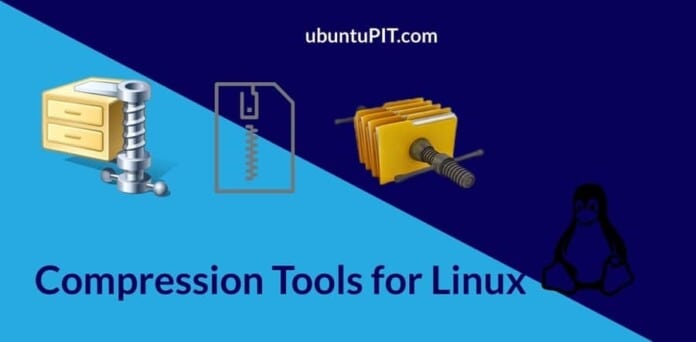Data archive or compression is a method or an algorithm that we can use to squeeze the volume of the data to make the size smaller. Data compression is helpful for storing files on a drive and sending them over the internet. When you decompress the data, it uses the reverse algorithm to make the files as it was. Compression or archive is essential for data analysis, storing, and transferring. If we look at Gmail’s file attachment section, we can see that it doesn’t attach files more than a specific size. In that case, you can use the archive tools to make the file size smaller. Plenty of free and open-source tools can do the data compression/archiving task in Linux.
Concept of Compression/Archiving
There are two types of data archive methods. They are lossless and lossy compression. Normally, the archive tools make a .zip, .rar, .tar.gz, and other extensions of files to compress the data. In digital computing, we only compress blocks and patterns of the binary digits.
If we look at our well familiar environment of computing, we can get a clear concept of data compression. When you apply the compression from PNG to JPEG, we just don’t change the photo format; we change the photo’s type, meta-data, and quality.
Best Archive Managers for Linux
Traditionally, different Linux distributions have their own built-in compression tool pre-installed inside the system. Like, Ubuntu has the archive manager for the GNOME desktop environment created by Paolo Bacchilega. Red Hat and other Red Hat-based Linux systems use the File Roller tool to compress files on the system. This post will detail the 15 best Archive Managers for Linux distributions in this post.
1. LZ4
LZ4 is an excellent compression tool written in the C programming language. It can compress more than half gigabytes of data per second. But of course, from practical experience, I can say that the compression rate can be slower when the data volume is less than the quantity of the data. It uses the lossless compression algorithm LZ4_HC and LZ77 to compress the data. You can accelerate the rate of data compression from the LZ4 features.
The LZ4 supports API and CLI-based services, which means you can use a pop-up tool of LZ4 on your system, and you can use the LZ4 compression tool through your Linux command-line interface. You can find the LZ4 compression tool’s repository in the official repository of Linux, which makes the installation of LZ4 easier.
Important Features of LZ4
- LZ4 can compress data at a higher speed.
- Though there is no method to set a password in the LZ4, you can do it with a little help from CryptoStream.
- LZ4 offers you a lossless compression.
- Installing LZ4 is a straightforward process on Linux distributions.
- You can handle big data compression with the LZ4 tool.
2. Zstandard

The Zstandard compression tool is invented by Facebook Inc. The Zstandard tool was written n Java, Python, Rust, C#, and PHP language. This means that you can deploy the Zstandard tool on your website to compress files.
It can compress files at the speed of 500MB per second and decompress at the ratio of 1660MB per second. It clearly means that the compression and decompression ratio is 2.8. But with additional plugins and hardware accelerations, the ratio could be reached at the value of 9.9.
The Zstandard tool has an enormous number of APIs and plugins set to install on your Linux system. It has a very simple user interface. The graphical user interface of the Zstandard tool is very straightforward and easy to use.
Important Features of Zstandard
- Zstandard allows users to compress and decompress files simultaneously.
- You can assign the Zstandard tool to compress your entire database.
- Zstandard can use the dictionary compression method to reduce the compression time.
- Zstandard can automate similar types of compressions by splitting the tasks.
- You can set the compression and decompression ratio at the Zstandard tool.
3. Brotli
Brotli is an average archive manager that can be installed on Windows and Linux platforms. It is a click and archive manager for Linux distributions. Brotli can be used and configured freely with any cloud-based server or database. It is written in Python, and it uses the lossless method of data compression. It compresses data in the same order as the input formats.
Important Features of Brotli
- You can decrease the latency of compression by using the Brotli tool.
- Brotli has made web performance smoother.
- You can install Brotli plugins on WordPress to decrease the loading time of media files on your site.
- Brotli can be configured with Nginx and other web servers.
- The graphical user interface of Brotli is straightforward.
4. Lzop
Lzop is one of the free and open-source archive managers for Linux. It is available for almost every Linux distribution. It is written in C programming language. It uses the Lempel–Ziv–Oberhumer (lzo) data compression algorithm. The decompression rate in Lzop is higher than in Lzop. You can use the Lzop compression tool along with your Linux command-line interface.
Important Features of Lzop
- Lzop is portable; you can use it without installing it on your system.
- The data compression in rate in Lzop is tremendously fast.
- It uses .tzo and .tar file extension.
- It allows for the compression and decompressing of multiple files simultaneously.
- You can deploy the Lzop tool to compress data on the Hadoop file system.
5. Pigz
The Pigz is pronounced as pig-zee, which is one of the most used archive managers. It is developed by Mark Adler and written in C programming language. You can compress, decompress and even recover the damaged compressed file through the Pigz archive manager on your Linux system.
If you have a multi-threaded process on your Linux system, the compression rate can be improved by the default settings of the Pigz tool. By default, it compresses data in the .zz format.
Important Features of Pigz
- Pigz can magically reduce the time of compression.
- You can compress an enormous amount of files in a single command.
- The Pigz compression tool is helpful for Linux sysadmins.
- You can choose which file extension you want to add to the compressed file.
- It pop-ups an error message if anything goes wrong during compression.
6. Pixz
Pixz is one of the handiest and quick tools for data compression or archive managers on Linux, developed by Dave Vasilevsky. Pixz uses the XZ utils tool and Lempel–Ziv–Markov chain algorithm to compress data that provides lossless data compression. Pixz uses the POSIX threads, libarchive, and other library functions to make the tool powerful.
As it uses the XZ tool, so the output files extension of the Pixz tools is .xz by default. However, you can pick any other compression suffixes or extensions to enclose the file name. Compared to other data compression tools, Pixz has the same compression ratio as 7z.
Important Features of Pixz
- Pixz can automatically detect archive files from your local directory.
- You can simultaneously compress and decompress files through the Pixz tool.
- It automatically detects your hardware configuration and CPU cores to give you maximum performance.
- In Linux, the Pixz tool automatically keeps the standard output logs.
- It uses the parallel data decompression triangle mesh topology.
7. PXZ
PXZ is an excellent handy archive manager for Linux distributions. It can perform better in a system that has a rich hardware configuration. The PXZ uses the Lempel–Ziv–Markov chain algorithm (LZMA) algorithm to compress data. It is written in C programming language. It was primarily built under the Fedora project, but you can download the source code of PXZ from GitHub.
Important Features of PXZ
- Initially, PXZ uses your system’s default settings and parameters to compress data.
- It is easy to install and can automatically detect the system configuration.
- PXZ can use a maximum of four threads.
- It keeps both the original and compressed files in the same directory.
- It’s effortless to install and use on Linux-based systems.
8. WinRar

Winrar is one of the most popular archive managers available on the web for the Windows operating system. But Winrar is now also available for Linux distributions. You can use the Winrar compression tool on your Linux system through the command-line user interface (CLI) method. Winrar uses Simultaneous multithreading (SMT) technology to make the performance better. You can zip and unzip almost every type of compressed file on your system.
Important Features of Winrar
- Winrar can extract ISO files.
- You can compress too many tiny files at a time without any file-missing issues.
- Winrar allows users to encrypt the file while compressing.
- It supports lossless data compression.
- Winrar is free to use for personal use.
9. Gzip

Expert Linux users probably have already guessed the functionality and behavior of the compression tool I will introduce now. Gzip is the best archive manager for Linux that was developed and maintained under the GNU project. It provides complete lossless file compression. You can use the Gzip compression tool in the GUI mode and the CLI mode on your Linux system.
Important Features of Gzip
- By default, it creates the .gz file extension while compressing a file.
- It uses the LZ77 and the Lempel–Ziv–Welch method to compress files to reduce file size.
- Gzip automatically shrinks the long file names while compressing.
- You can compress multiple files at a time through the Gzip tool.
- You can run gzip commands on your terminal shell to operate the Gzip tool through the Linux terminal.
Download
10. Bzip2
Bzip2 is an open-source file compression/archive manager for Linux written in C programming language and developed by Julian Seward. Suppose uses the block-sorting compression algorithm to compress files. The Bzip2 compression tool uses the prediction by partial matching (PPM) method to reduce the compression time by sorting the index and context.
Important Features of Bzip2
- The Bzip2 compression tool uses the dynamic adaptive dictionary technique.
- It uses the LZ77 algorithm to compress data.
- It has a built-in run-length encoding (RLE) system to make the compression losses.
- As it uses the Huffman coding terminology, it can be used to compress raw data.
- The Bzip2 tool allows users to compress data while transmitting the data through a server or tunnel.
11. Pbzip2
Pbzip2 is a very quick and lightweight compression tool that you can use on a Linux system to do short and snappy compression and decompression tasks. It is written in C++ programming language. It has the privacy license of Berkeley Software Distribution (BSD).
As the Pbzip2 is a lightweight tool, many giant compression tools have adapted the library function of Pbzip2 into their compression system. The algorithm of Pbzip2 is designed so that it divides the file into pieces, compresses the files individually, and later merges those files to make a whole compressed file. That method can perform a speedy and faster compression task.
Important Features of Pbzip2
- The Pbzip2 compression tool is a cross-platform application; it can be installed on Linux, Windows, and Mac operating systems.
- It supports parallel compression.
- You can accelerate the compression speed through the Pbzip2 if your system has a multi-core processor.
- It allows compressing larger than four gigabytes of files.
- It can be installed on a microprocessor computer.
12. Lrzip
Lrzip is one of the best archive managers for Linux distributions that can handle larger files. You can encrypt and protect your files while compressing by setting a password. If we look at the name of the tool, we can see that Lrzip is the short form of Long-Range Zip.
The title should imply that it can compress and decompress heavy files without losing quality. But the Lrzip tool can handle up to 100 MB-sized files. But if you have heavy hardware, it can expand its efficiency. Con Kolivas created the Lrzip tool, and it is written in the C programming language.
Important Features of Lrzip
- The Lrzip tool uses the SHA2-512 encryption algorithm to encrypt files.
- Lrzip functions with standard input and output methods.
- It can be used in the background of your system.
- You can manually set the compression parameters from the settings.
- It uses the mmap function to store the temporary data on the RAM.
13. Plzip
The Plzip is a free and open-source archive manager. Initially, you can compress up to 16GB of data at a time through the Plzip compression tool. But if you have an upgraded hardware system, you can compress and decompress larger files through the Plzip compression tool on your Linux system.
It has the GNU privacy license, which means you can modify the source code under the terms of the privacy license. The Plzip tool is smart enough to analyze the type of file and choose the most efficient method to compress files. It is written in C++ programming language.
Important Features of Plzip
- It is compatible to function with other compression tools.
- It can perform a few data recovery tasks.
- It splits the input files and divides the whole file into many parts to finish the task quickly.
- You can repair damaged parts of a compressed file through the Plzip tool.
- You can perform multi-threaded compressing and decompressing operations through the Plzip tool.
14. XZ Utils
XZ Utils is a compression tool for Linux, BSD, Free BSD, GNU, and Unik-like systems. It also has a GNU privacy license. It is written in C and Python programming languages. Compressing files through the XZ Utils is very easy; you would like the simple user interface mode of zipping or unzipping files. Though the XZ Utils uses a bit more system resources, the performance is sufficient.
Important Features of XZ Utils
- XZ Utils can use a few API-based library tools to improve the compression ratio.
- You can run the XZ tool through the CLI mode.
- It uses the LZMA algorithm to compress files.
- The XZ Utils can provide lossless data compression.
- It can check for data errors during the compression.
15. 7-Zip

7-Zip is one of the best archive managers for Linux distributions. It can compress and decompress almost every type of file. Even you can extract an ISO file through the 7-Zip tool. 7-Zip allows users to set passwords while compressing files. Igor Pavlov created 7-Zip, which has GNU and GPL privacy licenses. The C++ programming language is used to create the 7-Zip compression tool.
Important Features of 7-Zip
- 7-Zip uses the Advanced Encryption Standard (AES) method to encrypt archive files.
- 7-Zip does support the WAVPack file types.
- You can recover corrupted compressed files through the 7-Zip tool.
- You can use 7-Zip through the command-line interface.
- 7-Zip can use the maximum power of the system’s CPU.
Final Words
While describing all the compression tools for Linux, it has been seen that the maximum of the compression tools is written in either C, C++, or C# programming language. From that hint, we can say that all the compression tools are built in a particular manner to interact with the system hardware directly. We can also say that any compression tools’ performance slightly depends on the system’s configuration.
I have described a list of the most used and efficient compression tools for Linux distribution in the entire post. You can start with the 7-zip or the pbzip2 tool if you are a newbie on Linux. If you are a fan of Winrar and love to work in the command-line interface, I recommend you give it a shot. However, you try any compression tool you find suitable for your Linux system. You can also stick with the default archive manager of your Linux system.
Please share this post with your friends and the Linux community if you find it useful and informative. In the comment section, you can write us your opinions regarding this post.


